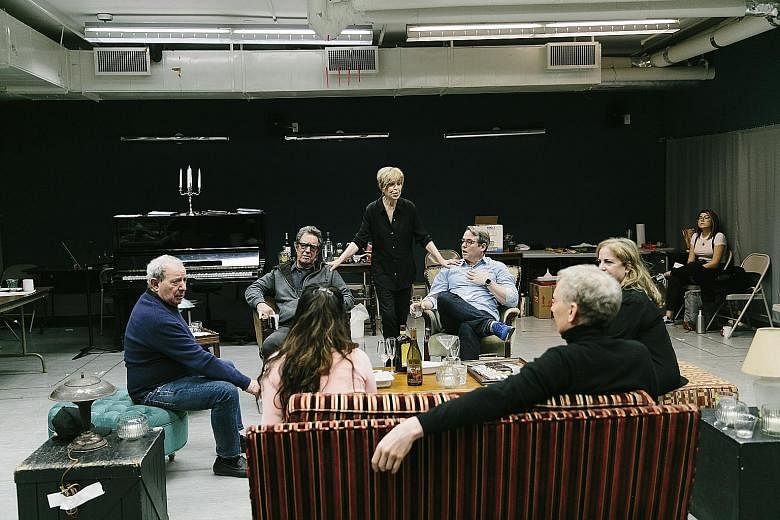NEW YORK • An autocratic leader has won the vote. He has charm, yes, and smarts of a kind, but also a cruel streak. Beatings are frequent, and assassination - foreign and domestic - has become commonplace. His cultural pronouncements have had a chilling effect on the arts, theatre in particular.
Take your seat for Evening At The Talk House, an ultra-dark comedy by the playwright-actor Wallace Shawn for the New Group that opens at the Signature Center tomorrow. Though written years before United States President Donald Trump announced his candidacy, and first produced in London in the fall of 2015, the play may strike some as oddly prescient.
Set in the course of one night, it eavesdrops on several people who worked together on Midnight In A Clearing With Moon And Stars, a fictitious flop from a decade ago. They have gathered for a reunion at a rundown club. As they snack and sip and reminisce, they reveal the brutality of the world outside and the ways that artists can abet it, resist it and ignore it.
The London production stoked controversy, with The Independent approvingly describing a "disturbing, balefully hilarious new play", while many other critics attacked its tone, pace and politics. More than a year later, in the wake of Brexit and the US presidential election, that controversy is likely to resonate anew.
Shawn, who also appears in the play, director Scott Elliott and cast members such as Matthew Broderick, Jill Eikenberry, Larry Pine, Annapurna Sriram and Michael Tucker discussed drama as protest.
Is this a political play?
Tucker: Yes. It's other things too. But it's most certainly political.
Eikenberry: I felt when I first read it that it was extremely relevant to our situation in this world, in this country. After the election, it felt way more relevant, chillingly relevant.
In the play, theatre has died out. Is this likely?
Sriram: A lot of friends my age don't go to theatre. I have one friend who will probably come and this will be his second play. His first was another play I did. I definitely wonder what the next generation of theatregoers will look like.
Broderick: When I first did a play, I was absolutely sure that Broadway was dead. And now every time I'm in a play, you can't get a theatre. Your young friends are going to start watching plays at some point.
If it did die, would that be so bad?
Broderick: I would be fine with that. We would get paid more.
Tucker: It would be a great loss. When it works, there's nothing like it. If there were no theatres, no one could ever say, "I saw that, I was there, that moment."
Eikenberry: It's been around for an awful long time; it's hard to imagine that even this administration could do away with it. People don't go to church that much anymore. They need collective experience.
What does it mean if apparently nice people just go on eating snacks and drinking cocktails and making art while these things are happening?
Eikenberry: That's the question of the play.
Sriram: I feel grateful in real life just for the privilege of getting to be an actor, that I have the kind of sometimes insane work of putting on costumes and playing pretend, for a living. But what is my responsibility other than just trying to achieve and have ambition and success?
Shawn: Our complacency is dangerous to other people.
Our President has a lot of strong opinions on art. How would you feel if he liked this play?
Broderick: That should happen! A fan's a fan.
Pine: I don't think he's interested in plays.
Will you invite him?
Elliott: Why not? Let him see it.
Shawn: I don't know if it could influence Trump. It's only 90 minutes long, but he's one of those people who's interested in himself, and when the topic goes off of him he becomes bored. We don't mention him in the play. Maybe we should change that.
NYTIMES

